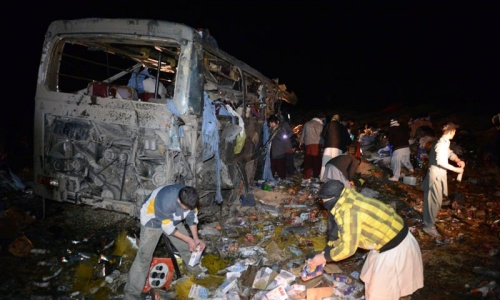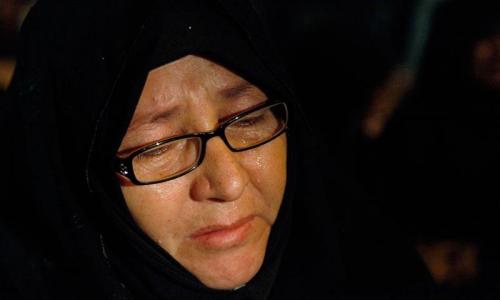QUETTA: The grieved Shia Hazara community decided to end the two-day long sit-in against the deadly Taliban bombing in Mastung following strong assurance given by Interior Minister Chaudhry Nisar Ali Khan led government delegation on Thursday night.
A government delegation comprising Chaudhry Nisar and Information Minister Pervez Rashid had reached Quetta upon Prime Minister Nawaz Sharif’s directives.
In order to pursue the protesters to end their sit-in, the premier had directed the federal ministers to hold negotiations with the Hazara community.
The federal minister assured that a targeted operation would be conducted against the perpetrators of Mastung killings.
Despite dry-chilly weather, protesters, including women and children, have been holding sit-ins across the country including Karachi, Quetta, Lahore, Islamabad, Multan and Hyderabad to voice anguish at the deadly suicide attack on a bus carrying Shia pilgrims in Mastung that killed 30 people.
The banned militant organisation Lashkar-e-Jhangvi (LeJ) claimed responsibility for Tuesday’s attack, which it described as a suicide bombing, and warned of more such attacks.
Last year, thousands of mourners staged a three-day sit-in from Jan 10 to 13 in the aftermath of twin-bombings that had left over 100 people dead.
“We will bring the terrorists to book,” Chaudhary Nisar told a grief-stricken gathering of Shia Hazaras. He assured that terrorists would not be allowed to take law into their hands and that all out efforts would be made to restore the order in the province.
“I stand by the Hazara community in this hour of grief and trial,” the interior minister stated.
After almost 38 hours, the federal government succeeded in cajoling the angry protesters to end their sit-in.
The protesters had brought 27 dead bodies of Mastung blast at Alamdar road to mourn their killing and press the authorities to launch a crack down against the perpetrators of the incident.
“We announce to end the sit-in,” Abdul Khaliq Hazara, the chairman of Hazara Democratic Party told the gathering.
Immediately after the announcement, relatives of the victims refused to bury the dead calling the assurances given by the government as hollow. Some of the enraged relatives came close to the stage and chanted full-throated slogans against the government.
However, they also agreed to end the protest following reassurances from community elders and Shia leaders.
Chief Minister Balochistan Dr Abdul Malik Baloch, Federal Information Minister Pervez Rashid and others also accompanied the federal minister. They held thorough negotiations with the members of Hazara community in order to convince them to end the protest.
After successful negotiations, Abdul Khaliq Hazara said that the dead bodies would be buried at 10am on Friday morning.
Following the decision taken in Quetta, Shia protesters across the country also ended their demonstrations.
Earlier, assailing the federal government for being apathetic towards the protesters, the Majlis Wahdatul Muslimeen (MWM) had called for a countrywide strike on Friday, which has been taken back now.
Police fired teargas shells and arrested around eight people to disperse the protesters staging one of the several sit-ins in Karachi.
Leaders belonging to the Shia community condemned the incident that took place at Tower calling it a “cruel act by the police”.
Sit-ins staged on different patches of the metropolis' major artery Shahrah-e-Faisal had left residents of localities beyond the city's airport almost stranded throughout the day.
Shahrah-e-Pakistan that connects Karachi with other parts of the province through Super Highway was another affected area, compelling people from parts of the Federal B Area and Abul Hassan Ispahani Road to remain indoors, with all businesses almost closed.
Due to the closure of main roads, traffic was suspended and flight schedules were also affected.























































